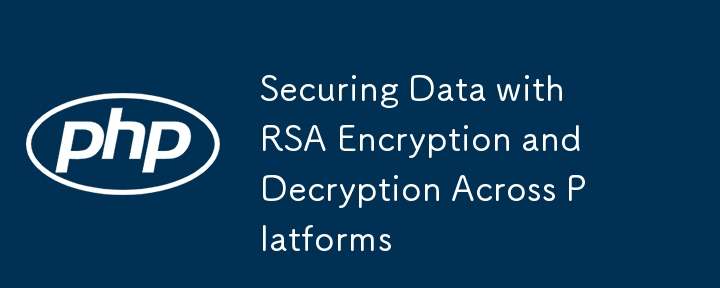RSA 暗号化と復号化によるプラットフォーム間でのデータの保護

Introduction to RSA Encryption
In today's digital landscape, securing sensitive data is crucial for individuals and organizations alike. RSA (Rivest-Shamir-Adleman) encryption stands out as a robust solution for protecting data. It is an asymmetric encryption algorithm, which means that it uses a pair of keys: a public key for encryption and a private key for decryption. One of the main benefits of RSA encryption is that the private key never needs to be shared, which minimizes the risk of it being compromised.
This article explores how to use RSA encryption across three popular programming languages—JavaScript, Python, and PHP—making it easier to secure data in cross-platform applications.
Cross-Platform Encryption and Decryption: The Scenario
Imagine you're building a web application where sensitive information (like authentication data or personal details) must be securely transmitted between the client (front end) and the server (back end). For instance, you might encrypt a message on the client side in JavaScript and then decrypt it on the server using either Python or PHP.
RSA is well-suited for this scenario because it provides the flexibility of encryption in one language and decryption in another, ensuring cross-platform compatibility.
RSA Implementation: JavaScript, Python, and PHP
JavaScript (Next.js with JSEncrypt)
Encryption:
import JSEncrypt from 'jsencrypt';
// Function to encrypt a message using a public key
const encryptWithPublicKey = (message) => {
const encryptor = new JSEncrypt();
const publicKey = process.env.NEXT_PUBLIC_PUBLIC_KEY.replace(/\\n/g, "\n");
encryptor.setPublicKey(publicKey);
const encryptedMessage = encryptor.encrypt(message);
return encryptedMessage;
};
Decryption:
import JSEncrypt from 'jsencrypt';
// Function to decrypt a message using a private key
const decryptWithPrivateKey = (encryptedMessage) => {
const decryptor = new JSEncrypt();
const privateKey = process.env.PRIVATE_KEY.replace(/\\n/g, "\n");
decryptor.setPrivateKey(privateKey);
const decryptedMessage = decryptor.decrypt(encryptedMessage);
return decryptedMessage;
};
Explanation:
Public Key Encryption: The JSEncrypt library encrypts the message using the public key. This ensures that only the corresponding private key can decrypt it.
Private Key Decryption: The message is decrypted with the private key, which is securely stored in an environment variable.
Security Consideration: By using RSA, we ensure that the data sent from the client is encrypted and secure.
Python (using rsa library)
Encryption:
import rsa
import base64
def encrypt_with_public_key(message: str, public_key_str: str) -> str:
public_key = rsa.PublicKey.load_pkcs1_openssl_pem(public_key_str.encode())
encrypted_message = rsa.encrypt(message.encode(), public_key)
return base64.b64encode(encrypted_message).decode()
Decryption:
import rsa
import base64
def decrypt_with_private_key(encrypted_message: str, private_key_str: str) -> str:
private_key = rsa.PrivateKey.load_pkcs1(private_key_str.encode())
encrypted_bytes = base64.b64decode(encrypted_message.encode())
decrypted_message = rsa.decrypt(encrypted_bytes, private_key)
return decrypted_message.decode()
Explanation:
Public Key Encryption: The message is encrypted using a public key, ensuring that only the intended private key holder can decrypt it.
Base64 Encoding: After encryption, the message is Base64 encoded to ensure compatibility with text transmission.
Private Key Decryption: The private key is used to decrypt the Base64-encoded encrypted message, ensuring confidentiality.
PHP (using OpenSSL)
Encryption:
function encrypt_with_public_key($message) {
$publicKey = getenv('PUBLIC_KEY');
openssl_public_encrypt($message, $encrypted, $publicKey);
return base64_encode($encrypted);
}
Decryption:
function decrypt_with_private_key($encryptedMessage) {
$privateKey = getenv('PRIVATE_KEY');
$encryptedData = base64_decode($encryptedMessage);
openssl_private_decrypt($encryptedData, $decrypted, $privateKey);
return $decrypted;
}
Explanation:
Public Key Encryption: The openssl_public_encrypt function encrypts the message using the public key, ensuring that only the private key can decrypt it.
Private Key Decryption: The openssl_private_decrypt function decrypts the message using the private key, ensuring that sensitive information remains secure.
Environment Variables: Both the public and private keys are securely stored in environment variables, enhancing security.
Best Practices for Encryption
Use Environment Variables: Always store your keys in environment variables instead of hard-coding them into your application. This reduces the risk of exposing sensitive information.
Encrypt Sensitive Data: Encrypt personal and sensitive data such as passwords, financial details, or personally identifiable information (PII) to prevent unauthorized access.
Use HTTPS: Ensure your application communicates over HTTPS to safeguard data in transit.
Secure Key Management: Regularly rotate encryption keys and ensure they are stored securely.
Why Choose RSA Encryption?
Enhanced Data Security: RSA encryption ensures that sensitive data is kept secure during transmission, preventing unauthorized access.
Asymmetric Encryption: RSA uses a public key for encryption and a private key for decryption, which ensures the private key never needs to be shared.
Cross-Platform Compatibility: RSA works seamlessly across different platforms and programming languages, making it ideal for web applications where different technologies are used on the client and server sides.
結論
RSA 暗号化は、複数のプログラミング環境にわたって機密データを保護する信頼性の高い方法を提供します。 RSA 暗号化と復号化を JavaScript、Python、PHP に実装することで、機密情報を保護し、セキュリティを強化し、クロスプラットフォーム互換性を確保できます。 API 呼び出しの保護、ユーザー データの保護、メッセージの機密性の確保など、RSA は堅牢な暗号化ソリューションを提供します。
このガイドが役立つと思われた場合は、他の開発者とこのガイドを共有することを検討してください。暗号化とデータ セキュリティについてのさらなる洞察を今後もお楽しみください!
暗号化 #RSA #サイバーセキュリティ #データセキュリティ #Web開発 #クロスプラットフォームセキュリティ #JavaScript #Python #PHP
以上がRSA 暗号化と復号化によるプラットフォーム間でのデータの保護の詳細内容です。詳細については、PHP 中国語 Web サイトの他の関連記事を参照してください。

ホットAIツール

Undresser.AI Undress
リアルなヌード写真を作成する AI 搭載アプリ

AI Clothes Remover
写真から衣服を削除するオンライン AI ツール。

Undress AI Tool
脱衣画像を無料で

Clothoff.io
AI衣類リムーバー

AI Hentai Generator
AIヘンタイを無料で生成します。

人気の記事

ホットツール

メモ帳++7.3.1
使いやすく無料のコードエディター

SublimeText3 中国語版
中国語版、とても使いやすい

ゼンドスタジオ 13.0.1
強力な PHP 統合開発環境

ドリームウィーバー CS6
ビジュアル Web 開発ツール

SublimeText3 Mac版
神レベルのコード編集ソフト(SublimeText3)

ホットトピック
 7543
7543
 15
15
 1381
1381
 52
52
 83
83
 11
11
 21
21
 87
87
 JSON Web Tokens(JWT)とPHP APIでのユースケースを説明してください。
Apr 05, 2025 am 12:04 AM
JSON Web Tokens(JWT)とPHP APIでのユースケースを説明してください。
Apr 05, 2025 am 12:04 AM
JWTは、JSONに基づくオープン標準であり、主にアイデンティティ認証と情報交換のために、当事者間で情報を安全に送信するために使用されます。 1。JWTは、ヘッダー、ペイロード、署名の3つの部分で構成されています。 2。JWTの実用的な原則には、JWTの生成、JWTの検証、ペイロードの解析という3つのステップが含まれます。 3. PHPでの認証にJWTを使用する場合、JWTを生成および検証でき、ユーザーの役割と許可情報を高度な使用に含めることができます。 4.一般的なエラーには、署名検証障害、トークンの有効期限、およびペイロードが大きくなります。デバッグスキルには、デバッグツールの使用とロギングが含まれます。 5.パフォーマンスの最適化とベストプラクティスには、適切な署名アルゴリズムの使用、有効期間を合理的に設定することが含まれます。
 PHPにおける後期静的結合の概念を説明します。
Mar 21, 2025 pm 01:33 PM
PHPにおける後期静的結合の概念を説明します。
Mar 21, 2025 pm 01:33 PM
記事では、PHP 5.3で導入されたPHPの後期静的結合(LSB)について説明し、より柔軟な継承を求める静的メソッドコールのランタイム解像度を可能にします。 LSBの実用的なアプリケーションと潜在的なパフォーマ
 確固たる原則と、それらがPHP開発にどのように適用されるかを説明してください。
Apr 03, 2025 am 12:04 AM
確固たる原則と、それらがPHP開発にどのように適用されるかを説明してください。
Apr 03, 2025 am 12:04 AM
PHP開発における固体原理の適用には、次のものが含まれます。1。単一責任原則(SRP):各クラスは1つの機能のみを担当します。 2。オープンおよびクローズ原理(OCP):変更は、変更ではなく拡張によって達成されます。 3。Lischの代替原則(LSP):サブクラスは、プログラムの精度に影響を与えることなく、基本クラスを置き換えることができます。 4。インターフェイス分離原理(ISP):依存関係や未使用の方法を避けるために、細粒インターフェイスを使用します。 5。依存関係の反転原理(DIP):高レベルのモジュールと低レベルのモジュールは抽象化に依存し、依存関係噴射を通じて実装されます。
 フレームワークセキュリティ機能:脆弱性から保護します。
Mar 28, 2025 pm 05:11 PM
フレームワークセキュリティ機能:脆弱性から保護します。
Mar 28, 2025 pm 05:11 PM
記事では、入力検証、認証、定期的な更新など、脆弱性から保護するためのフレームワークの重要なセキュリティ機能について説明します。
 フレームワークのカスタマイズ/拡張:カスタム機能を追加する方法。
Mar 28, 2025 pm 05:12 PM
フレームワークのカスタマイズ/拡張:カスタム機能を追加する方法。
Mar 28, 2025 pm 05:12 PM
この記事では、フレームワークにカスタム機能を追加し、アーキテクチャの理解、拡張ポイントの識別、統合とデバッグのベストプラクティスに焦点を当てています。
 PHPのCurlライブラリを使用してJSONデータを含むPOSTリクエストを送信する方法は?
Apr 01, 2025 pm 03:12 PM
PHPのCurlライブラリを使用してJSONデータを含むPOSTリクエストを送信する方法は?
Apr 01, 2025 pm 03:12 PM
PHP開発でPHPのCurlライブラリを使用してJSONデータを送信すると、外部APIと対話する必要があることがよくあります。一般的な方法の1つは、Curlライブラリを使用して投稿を送信することです。
 システムの再起動後にUnixSocketの権限を自動的に設定する方法は?
Mar 31, 2025 pm 11:54 PM
システムの再起動後にUnixSocketの権限を自動的に設定する方法は?
Mar 31, 2025 pm 11:54 PM
システムが再起動した後、UnixSocketの権限を自動的に設定する方法。システムが再起動するたびに、UnixSocketの許可を変更するために次のコマンドを実行する必要があります:sudo ...





